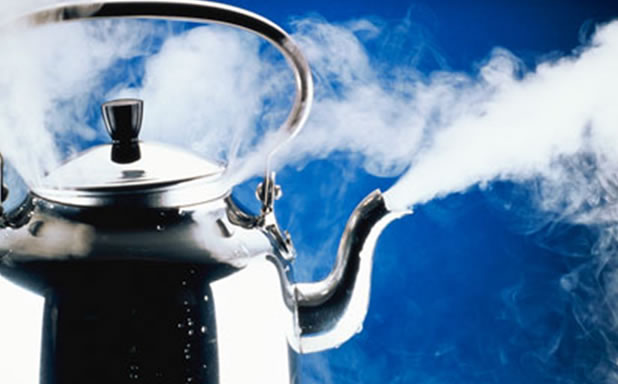Jun. 2004 Proverb: “Hot water does not burn down the house.” – Swahili (Eastern and Central Africa)
Maji ya moto hayachomi nyumba. (Swahili)
Hot water does not burn down the house. (English)

Swahili (Eastern and Central Africa) Proverb
Also Sukuma and Ngoreme (Tanzania), Kuria (Kenya, Tanzania)
Background, Explanation, Meaning and Everyday Use
It does not matter how steaming hot one boils some water. One cannot then pour it on the roof or on any wall of the house and expect any structural damage. Traditionally this Swahili proverb has been used to deny the effectiveness of the strenuous efforts of a lesser person against a greater or stronger one.
In addition however, a man’s “house” is the way he might refer to the place where he and his wife and family live. Talking then of a “house” easily suggests meanings that have to do with marriage and relationships. Some men lodge a second wife or girl friend in a “small house” which connotes a greater degree of stability and commitment there than would a more casual relationship. A man is often proud of the way he builds a house so as to provide adequate shelter against the elements (sun, wind, rain, etc.). A woman is often proud of her contribution or “touch” which shows up in the good order, food and comfort to be found in her “house” or “home”. “Hot water” usually boiled within or around a house readily connotes anger, ill spoken words, or conflicts in general. This proverb then has lent meaning to marriage by placing the more tempestuous aspects of the union within the context of an over-riding intention of stability, promise of fidelity or within the context of a marriage covenant. The “heat” of conflict is thereby rendered less destructive, and inevitable temporary irruptions are less apt to have a permanent effect.
The Sukuma version of this proverb says that arguments between a husband and wife are a normal part of married life. They don’t ruin a marriage. The couple has to work through their problems. A related Sukuma proverb says that The hoes of two people cultivating together in a field clash (hit against each other). Applied to marriage, the proverb means that two people living together are bound to have problems. But these problems do not destroy their marriage. The couple has to work out their difficulties.
 Biblical Parallels
Biblical Parallels
The history of salvation in the Judeo-Christian tradition is a hot, stormy history of the relationship between God and His People. But the “house” of His Love has withstood the “hot water” of disobedience. He gave his word in this history. He called His People. He gave his word in Covenant. He made promises. He sent his Son to complete the reconciliation and assure us of the forgiveness of sins and the stability of the “structure” of His Love. He loved His People not because they were manifestly faithful, but He loved because He decided to love. He built the House of Israel and He pitched his tent among His People, structures that are designed and maintained by His prophetic Word. He intends to stay and to establish solidarity with His People as a possibility without end.
So it is with Christ and the Church. Church people have deserted him often in history but never escaped his presence nor dissuaded him from love.
“I am convinced that neither death nor life, neither angels nor demons, neither the present nor the future, nor any powers, neither height nor depth, nor anything else in all creation, will be able to separate us from the love of God that is in Christ Jesus our Lord” (Romans 8: 39-39). Christian marriage is modeled on this love of Christ and His Church where “hot water does not burn down the house.” A God-like commitment of self to another person has power and longevity over the inevitable squabbles of people who live close together in the same house.
Contemporary Use and Religious Application
Wise people see tragedy more often than not in the context of possibility. Their mental house in life has room in it for unexpected and unsolicited setbacks. We help one another in life not by denying the “hot water” events of our friends, but by affirming their abiding strength and vision. Whatever the “higher power,” it is an invisible but spoken structure that will remain standing through the hot and cold of life. For recovering alcoholics surrender in the presence of an abiding “higher power” provides the structure within which the disease is manageable. Such a “higher power” may well be invisible, but its presence can be known by hearing word of it. In my own experience of training pastoral caregivers, I encourage pastors to find the words with which to construct the “house” or vision that sustains persons in crisis. In its absence persons in crisis are easily overwhelmed by “hot water.” Words of possibility and commitment “contain/hold back” the force of “hot water” events.
Rev. John Eybel, M.M.
Bugando Medical Centre
P.O. Box 10641
Mwanza, Tanzania
EMail: jeybel@bugando.org
